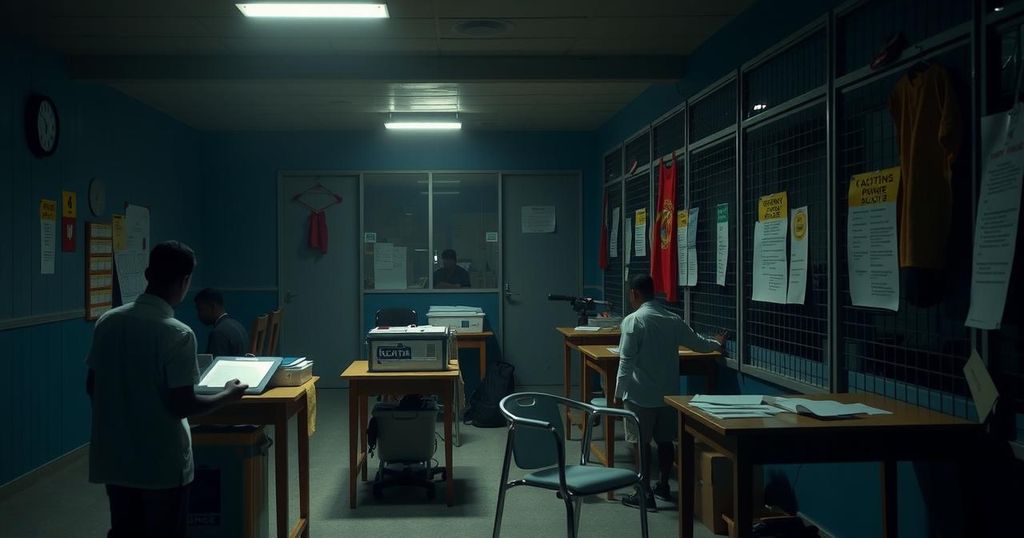Mauritius General Elections 2024: Wire-Tapping Scandal Raises Concerns for Democracy
Mauritius faces major political tensions as it approaches general elections amid a wire-tapping scandal that threatens the integrity of its democracy. Prime Minister Pravind Jugnauth seeks re-election amidst allegations of corruption and the erosion of civil rights, following the leak of intercepted communications involving key political figures. The elections also occur shortly after a significant territorial victory regarding the Chagos Islands, adding to national sentiment, but raising concerns about governance and social equity as citizens prepare to vote.
Mauritius is set to conduct general elections amidst a cloud of controversy due to a wire-tapping scandal that has raised alarm over the country’s democratic integrity. The political atmosphere has been charged since the revelation of intercepted communications involving politicians and media figures, which have been leaked online, igniting concerns regarding the erosion of civil liberties in this historically stable nation. Prime Minister Pravind Jugnauth seeks re-election but faces significant scrutiny following these leaks, which prompted the government to attempt a ban on social media, a move that was swiftly rescinded after backlash from opposition parties and citizens. The elections unfold just after Mauritius celebrated a significant legal victory in its long-standing territorial claims over the Chagos Islands from the United Kingdom, a situation that had further elevated national sentiments but now conflicts with internal political turmoil. As approximately one million citizens prepare to vote, concerns readily surface about the current regime’s track record on governance, particularly allegations of corruption and institutional failures. Democracy advocates suggest that the very mechanisms that once ensured balanced governance are becoming increasingly inactive, fueling discontent. Throughout its post-independence history, Mauritius has strived to solidify democratic governance; however, recent developments threaten this fragile stability. Key social issues, particularly affecting the Creole population, remain unresolved, revealing systemic inequities that challenge the country’s ideological narratives of progress. Despite a robust economy predominantly supported by tourism and services, the prevailing winner-takes-all electoral approach fosters an environment where political power is predominantly held by a select few families, raising questions about the future direction of the nation. Notably, as citizens prepare to cast their votes, external variables, such as potential changes in U.S. military presence following recent presidential elections, could significantly influence domestic politics in the years to come.
In recent years, Mauritius has been celebrated as a model of stability and democratic governance in Africa, boasting steady economic growth since its independence from Britain in 1968. The country’s political landscape has historically been dominated by three families, perpetuating a cycle of leadership that many criticize for fostering nepotism and limiting political diversity. The ongoing issues of discrimination against the Creole community, among other social grievances, have prompted increased scrutiny over the government’s handling of democratic institutions and processes, especially with election season approaching. The recent wire-tapping scandal, along with the unexpected ban on social media, revealed cracks in the image of democracy that Mauritius has cultivated over decades. Furthermore, the implications of the recent legal victory regarding the Chagos Islands add both a layer of national pride and tension, complicating the electoral atmosphere as citizens now also grapple with issues of civil rights and governance.
In conclusion, the upcoming general elections in Mauritius are underscored by significant challenges that threaten to undermine the nation’s democratic foundations. The backdrop of a wire-tapping scandal and restrictions on civil liberties, alongside long-standing issues of governance and social discrimination, cast a shadow on the electoral process. As the nation approaches these critical elections, the interplay between political legacies, emerging challenges, and the aspirations of its diverse populace will be pivotal in defining the future trajectory of Mauritius. Conclusionally, while the country celebrates its legal victories, the need for transparent governance and equitable representation remains more critical than ever.
Original Source: www.seychellesnewsagency.com




Post Comment